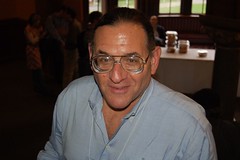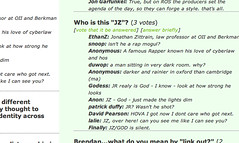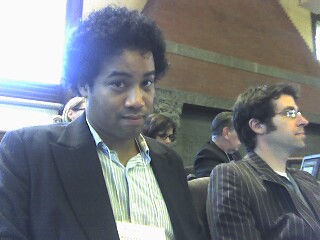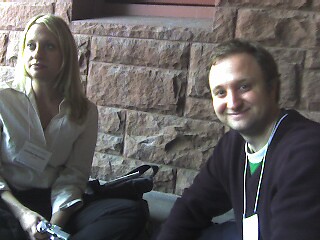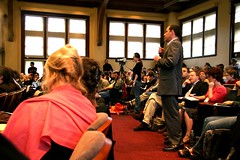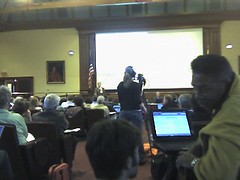Prosperity is in the disruption - it's countertuitive to ask broadcasters to embrace that!
1. Media unbundled at the point of origin and rebundled at the point of consumption - the problem is that you are only a content provider if you only bundle media- the business is helping people rebundle media for their own consumption.
2. mediated people make their own media
ALL ROADS LEAD TO
WKRN:Nashville is aggregating
blogs, maintain blogsosphere database and manage ad network for blogger and this results in: influence, visitors, reveunue and ratings
MY THOUGHTS
- Terry Heaton has been giving some great responses to questions. Many people were giving doomsday questions and figures - saying that only white people are using the internet and what happens when most people in the world aren't literate? Terry responded that illiteracy is not a result of internet access and increased access will not solve that illiteracy b.c it's a systematic social problem that we all need work on by talking to each other and figuring it out. THANK YOU TERRY FOR NOT NOT NOT PLAYING THE DIGITAL DIVIDE CARD!
- I like his answer!!!
- That's exactly what we are doing at freeDimensional by creating a civic participation journalism blogging program in Bedford-Stuyvesant that would contextualize the idea of mediating, creating and distributing their own media. We want to engage youth in literacy and critical thinking, and participatory technology is a means to an end - which is civic engagement, media literacy skills, technology skills and literacy skills.
- I am getting annoyed at all the questions that there aren't enough people of color using the internet or that too may folks of color are not online. I think what people are forgetting is that it's not in how many people of color are "sending e-mails" but we need to look at discrimination on a meta level - like in protocols, standards, codecs, IP rights and etc. That's why looking at China's movement in creating their own protocols is such a great case-study. They are literally fighting IP imperialism as we speak. photo uploaded by Dan Phiffer.
Technorati Tags: 2006, beyondbroadcast, blog, blogger, broadcast, freeDimensional, intellectual property, intellectural property, IP, media, racism, terry heaton, wkrn
 Me talking with Eli.
Me talking with Eli. 